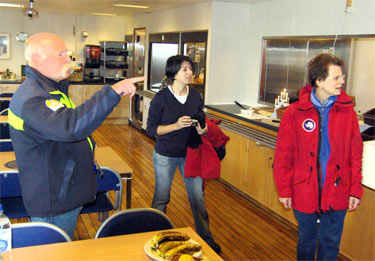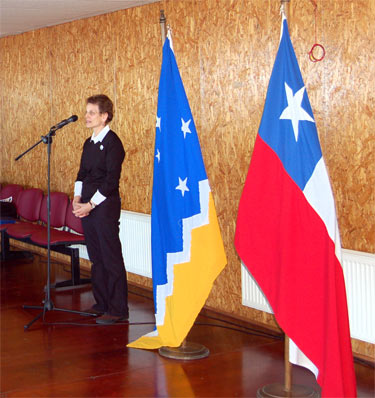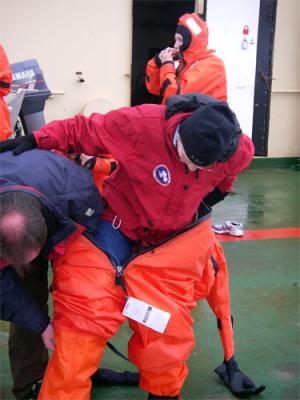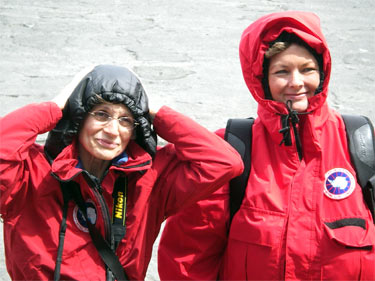Antarctic Explorer Career Option – TV, Film, Radio Producer and Director
So if you think that having passed many years of your life living and working in extreme environments such as Alaska or Scandinavia is a basic requirement for joining a polar expedition – let me introduce you to Valentine Kass. She is the Program Director for Informal Science Education at the National Science Foundation (NSF), and is on the Oden serving as the official NSF representative. Her role is to serve as a liaison between the NSF scientists and educators, and also coordinate their activities with the Swedish crew of the Oden. Here she is talking with the Oden's Dr. Krister Ekblad.

She’s also recording interviews that will become part of the official record of the expedition and may even be developed into some finished National Public Radio broadcasts and podcasts. In this photo she's addressing a VIP reception hosted by Chilean Antarctic Research Institute in Punta Arenas prior to our departure.

Valentine grew up as a child in Manhattan, and was educated in economics and city planning at Stanford. She worked for six years as the IMAX Producer and Director at the Museum of Science and Industry (MSI) in Chicago, during which time she had the opportunity to be the Executive Producer for the IMAX film "Antarctica.” This film was a collaborative effort with Australia and through this opportunity Valentine had the rare privilege of visiting numerous filming sites in Antarctica. The film was a tremendous success, and we even had the opportunity to watch it just a few evenings ago in the ship’s theater. Valentine left MSI for a similar job at the new Chicago Navy Pier IMAX theater, and then went on to become a nationwide consultant in the large format film industry. I wonder if dry suit training was part of that job assignment?

In 2001, her extensive background in media was a perfect match to come to the National Science Foundation, where she oversees a variety of grants that strive to provide science education opportunities for the public outside of the traditional classroom setting. Public television shows such as Peep and the Big Wide World and Cyberchase, IMAX films such as Wired to Win, as well as radio programs, afterschool opportunities, and museum exhibits are all examples of grants within her NSF portfolio. Here Valentine is with teacher Ute Kaden touring prior to departure.

When I asked Valentine what advice she would offer a student interested in following her footsteps, she felt that the key to discovering life’s great opportunities lies in pursuing those areas which interest and excite you – and doing so with excellence. She pointed out that careers in medicine, engineering, computers, the arts, security, and even politics can all lead to incredible opportunities – just as her career has lead to two opportunities to visit Antarctica. When she was in college – IMAX films had not even been invented – and yet it become the focal point and a significant portion of her career – the same will be true for young people today. We can’t predict what new and exciting opportunities will develop through changes in science, technology and society over the next twenty years – but we can be certain that the greatest opportunities will go to those who have mastered the basic skills available today. So dive into those opportunities that are on your plate today – because you never know where those new skills and knowledge will lead you.

